Google isn’t just a brand, it’s now a verb used across the world for internet searches. We don’t just search for something, we ‘Google it’.
Google is very good at what it does, but it comes with a cost. The internet giant is notorious for harvesting an incredible amount of personal information.
Data it uses to market to you, track you, target ads to you, see where you go, what you do and even what you buy.
Some people are fine with all this tracking and consider it a price of doing business.
Others don’t.
It is for these others that we have put together this list of the best search engines that aren’t Google.
Some concentrate on giving you a choice. Some focus on speed. Others think privacy is the core requirement of search engines.
The search engines you’ll see in a minute cover all three of those requirements.
How Do Search Engines Work?
Want to know the basics of how search engines work? Read on!
Search engines work using three distinct actions:
- Crawling
- Indexing
- Ranking
Search engines work by crawling the internet looking for content. They use complex bots called spiders that venture out into the internet looking for new websites, recently published pages, posts, videos and anything listed online.
XML sitemaps help search engines locate and crawl new content on your website.
Once crawled, the content will be indexed. That means recording links to the content and storing them within the search engine’s servers.
Once indexed, the content is then ranked. The search engine assesses its relevance and how it answers a particular question, query or search intent. The content will then be ranked according to how well it answers that criteria with the most relevant being ranked first and least relevant, last.
It is ranking that all your SEO efforts try to appeal to.
While the specifics behind these three actions are incredibly complex, their purpose is relatively straightforward.
The guys over at Moz have a very in-depth article on how search engines work.
What Is a Private Search Engine?
Private search engines are not necessarily privately owned. The term means the search engine better respects your privacy.
It refers to a search engine that doesn’t harvest every byte of personal data, record your every action online or follow you everywhere you go on the internet.
If you’re more concerned with privacy than with convenience, you should consider a private search engine.
Why Use a Private Search Engine?
The Google search engine is known for harvesting incredible amounts of data from every user. It records every search you make, every YouTube video you watch, everywhere you go, every app you use, all your Google Map data, Gmail data and a whole lot more.
You would be surprised at just how much information Google has on you.
Private search engines will collect little or no data about you or your searches.
That may mean less precise results and fewer personalized ads within search, but it also means surrendering a lot less, or none, of your personal information.
Not all the information Google collects is used against you. Some, like Google analytics data, you can use to benefit your own website and understand everything about visitors and how they interact with your site.
Google Alternative Search Engines to Consider
Google is just one of many search engines and while it’s definitely the most popular, it’s also the most controversial.
If you’re looking for the best search engine that doesn’t harvest all your data, try one of these:
1. Bing
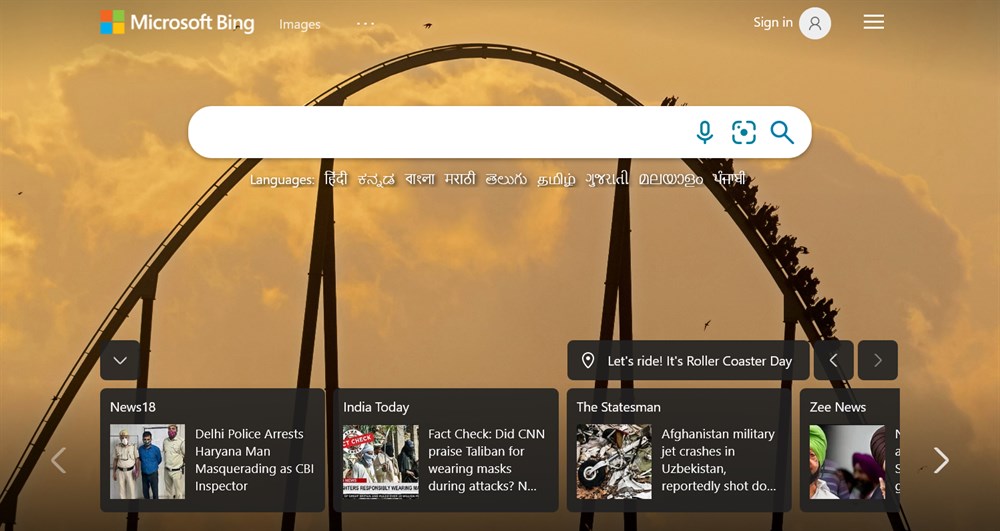
Bing is Microsoft’s answer to Google and second largest by market share.
Bing is easy to use, fast and has a great autocomplete function that stays relevant no matter how random your search. It also has translation, image search, video search, shopping tools, currency converters and other good stuff.
Features of Bing:
- Fast, powerful with relevant results
- Doesn’t collect quite as much data as Google
- Includes popular tools like translation and currency conversion
- Nice daily backgrounds to add interest
- Has its own SEO tools
Pros of Bing:
- It’s fast
- Good quality, relevant results
- Accessible on most devices including mobile
- Video search is particularly good
Cons of Bing:
- It’s Microsoft
- It still collects data
Opinion of Bing
Bing is useful if you don’t mind still giving up some data in return for a fast search engine. It’s powerful and covers a lot of the same ground as Google, but it does still depend on collecting data.
2. Yahoo

Yahoo has been around almost since the birth of the web. It has gone from a major player offering every kind of web service to a minor player in search and email. It’s still a useful option if you want to move away from Google though.
The landing page has a lot more than just search. It includes news, trending topics and lots of clickbait. There is also weather, search, email, shopping and more too.
Yahoo still collects data but not on the scale of Google. In return you get personalized news for your region and gradually more targeted ads.
Features of Yahoo:
- Functional search engine
- Uses a version of Bing to deliver results
- Fast, accurate searches
- Lots more useful stuff on the page
- Works on any device
Pros of Yahoo:
- Searches are fast and relevant
- The extra news, weather and information is useful for some
- Well-established name on the web
- Acts as a landing page as well as search engine
Cons of Yahoo:
- Still collects data
- Just a rebranded Bing
- The news and other page elements can be distracting
Opinion of Yahoo
Yahoo is pretty good as a search engine. Searches return relevant results, are fast and deliver mostly what you’re looking for. As the engine is a rebadged Bing, you may prefer using the original and not have to contend with all the distractions on the home page.
3. Baidu

Baidu is the most popular search engine in China with a huge market share. It looks and feels a lot like Google, except the text is all in Mandarin. You can have your browser translate it if you like though.
If you’re researching anything to do with China, Chinese territories or Chinese interests, this is the engine to use. However, it is heavily censored so anything controversial or that doesn’t fit within Chinese state views should be treated with caution.
Features of Baidu:
- Looks and works a lot like Google
- Huge coverage within China
- Good performance for searches
- Seems to deliver most acceptable relevant searches
Pros of Baidu:
- Instantly familiar and easy to use
- Covers lots of Chinese subjects and searches
- Works on any device
- Can be translated into English
Cons of Baidu:
- It is very heavily censored
- We have no idea about data collection but assume the worst
Opinion of Baidu
We include Baidu in our best search engines list mainly out of respect for the billion or so Chinese people around the world who use it. As a search engine, it’s fast and effective. As an unbiased and uncensored source of information, not so much.
4. Yandex
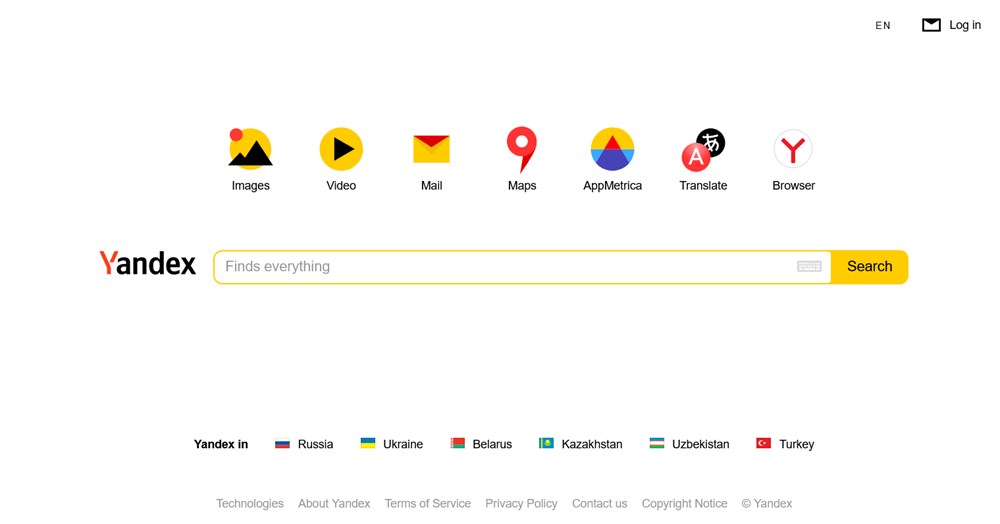
Yandex is the Russian equivalent of Baidu. It’s the nation’s most popular search engine with the majority market share.
It is also instantly recognizable as what it is and very easy to use. The app icons above the search bar are a nice touch and make it easy to navigate to wherever you need to go.
We have no idea about state censorship though. We know the state censors results but we don’t know to what level.
Features of Yandex:
- Clean interface with instantly recognizable functions
- Search is fast and seems relevant
- Colorful icons for extra functions
- Covers most features of Google
Pros of Yandex:
- Searches are fast and accurate
- The interface is clean and very straightforward
- Mail, video, images and more available in one place
- Excellent image search capability
Cons of Yandex:
- We assume it collects similar amounts of data as Google
- Subject to state censorship
Opinion of Yandex
Like Baidu, we include Yandex for completeness and also for the millions of Russians and people interested in Russian subjects. This internet search engine doesn’t offer any more than others but is definitely a viable alternative to Google.
5. DuckDuckGo
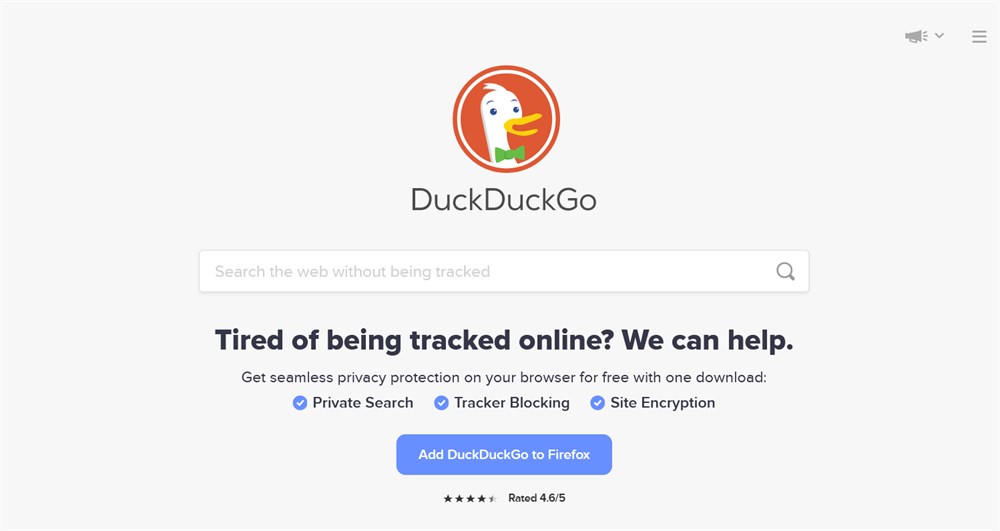
DuckDuckGo is the first ‘proper’ private browser in the list. It collates results from major competitors like Bing and Yahoo and removes identifiable information during the search.
DuckDuckGo doesn’t have quite the reach of Google and you’ll see some results missing but in return, it does not track you, does not log your data, does not resell or reuse your data or even collect your IP address.
They do save search queries though. They anonymize the data and use it to improve, but they do keep searches.
Features of DuckDuckGo:
- Private internet search engine
- Fast and accurate
- Uses Yahoo, Bing, Wikipedia and other sources in searches
- Doesn’t collect any identifiable data
Pros of DuckDuckGo:
- Private web browsing with almost zero data collection
- Covers a wide variety of searches using multiple sources
- Fast, relevant results
- Has smart website searches called ‘bangs’
Cons of DuckDuckGo:
- Still get advertising, just generic rather than targeted
- Ad-supported by affiliates like eBay and Amazon
Opinion of DuckDuckGo
DuckDuckGo is a genuine alternative to Google for the privacy conscious. It doesn’t track you, doesn’t follow you and doesn’t make its money from your data. It does retain searches and is ad-supported but otherwise is a solid contender.
6. Ask

Ask is a search engine but it works a little differently. It uses a question and answer format for searches instead of semantic search. It still generates credible results, just in a slightly different way.
Ask used to be called Ask Jeeves and has been around for years. It has slowly evolved to deliver great performance and more natural results, which works exceptionally well for some.
Features of Ask:
- Uses question and answer type searches rather than semantic search
- Clean interface that’s very easy to use
- Includes modest news and extra features without overloading the page
- Performs well
Pros of Ask:
- Some find asking questions an easier way to search the web
- Searches are fast and return relevant results
- Those in California can opt out of all advertising
- Extra page elements can be useful
Cons of Ask:
- There is still data collection
- Not enough differences to make it stand out
Opinion of Ask
If you prefer using the question and answer format for searches, Ask is excellent. It works well with natural language and returns relevant results no matter how random the question.
7. WolframAlpha
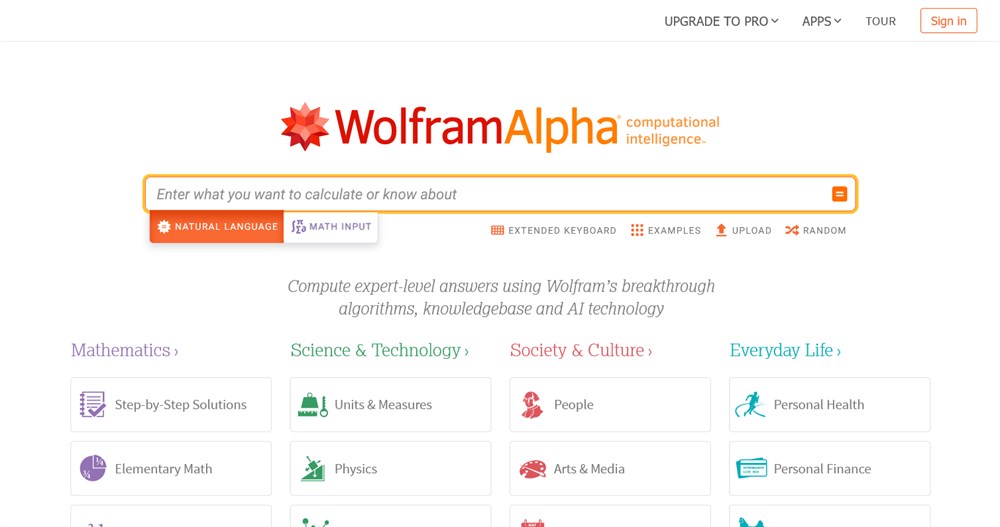
WolframAlpha is a private and privately-operated search engine. It’s also a specialist search engine that concentrates its efforts on specific research areas like people, health, finance, chemistry, hobbies and other subjects.
Searches are fast and you can use the search bar in the center or one of the section elements underneath. Results seem accurate and worth using if you’re researching or learning.
The engine is private and doesn’t track or record your activity.
Features of WolframAlpha:
- Privately owned search engine
- Does not track or record your searches
- Specializes more in research and learning than general search
- Has extensive resources ideal for study
Pros of WolframAlpha:
- Fast, targeted results
- Ideal for research or study
- Doesn’t track anything you do
- The Random button can be fun
Cons of WolframAlpha:
- Not a general use search engine
- Some features locked behind a subscription
Opinion of WolframAlpha
If you’re learning or studying, WolframAlpha is an excellent resource. Things do get messy if you use the sections but the general search is very good indeed.
8. StartPage
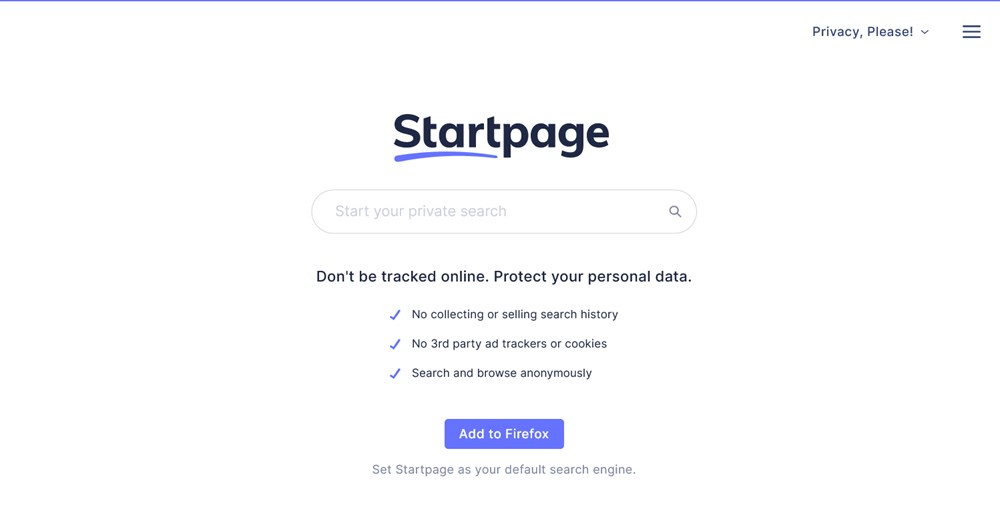
StartPage is one of the best search engines for privacy. It doesn’t track, it doesn’t trace and it doesn’t record anything you do.
StartPage markets itself as ‘The world’s most private search engine’. While it’s difficult to prove that claim, it is open about never collecting data on your searches.
Those searches are fast and relevant and while you do see ads, they are generic rather than targeted using your data, so are a small price to pay.
Features of StartPage:
- Clean, crisp user interface
- Transparent data collection policies
- Offers lots of advice on user privacy
- Searches are fast and relevant
Pros of StartPage:
- Genuinely private search engine
- Clean UI with instinctive design
- Works on any device
- Is upfront and clear about data collection
Cons of StartPage:
- Not quite the same breadth of results as Google
Opinion of StartPage
StartPage gets a lot right. It provides excellent search capabilities, doesn’t track you, has a neat proxy service for extra privacy and offers a clean, simple interface.
Nothing to complain about here!
9. Swisscows
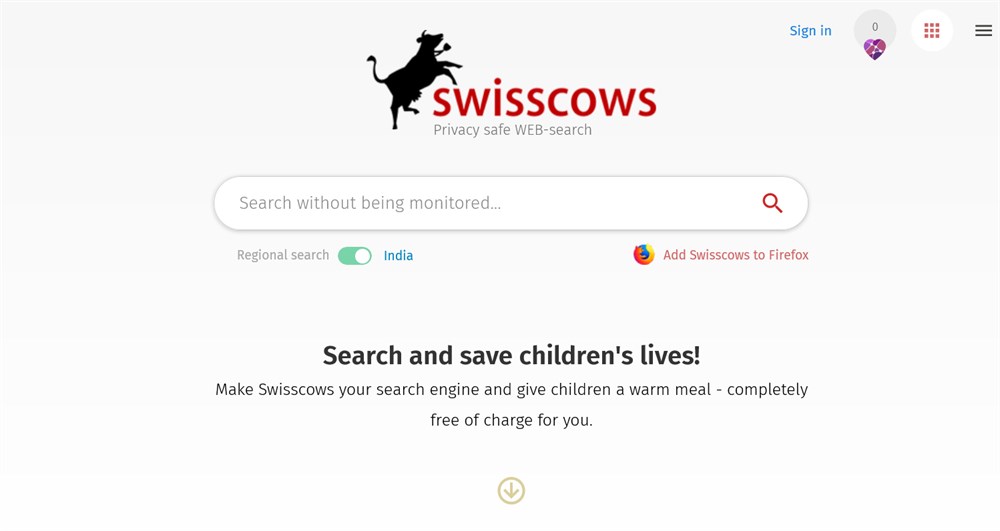
Swisscows, as the name suggests, is a Swiss search engine. Switzerland has some of the strictest data use policies in the world, which is good news for us.
The interface is clean and modern. It’s easy to use and comes with apps like KeyShift, Digest and its own messenger app. Each offers something a little different with the same emphasis on privacy.
Searches are fast, relevant and include most of what you would find on competing internet search engines.
Features of Swisscows:
- Clean interface
- Searches are fast and produce relevant results
- No data collection
- Based in Switzerland so really no data collection!
Pros of Swisscows:
- Truly private browser
- Those extra apps may be beneficial to some
- Works as well as the best search engines
- Related search query bubbles are a nice touch
Cons of Swisscows:
- Still ad supported
- Anonymous preview can be slow
Opinion of Swisscows
We like Swisscows. It’s fast, accurate and offers a range of options for private browsing. The Anonymous Preview option in search results is a good idea but it can be a little slow at times.
10. Boardreader

Boardreader isn’t a full search engine, more a search engine for bulletin boards and forums. It isn’t as fully featured as the best search engines, but what it does, it does very well.
If you’re searching forums or boards for answers, this is the engine to use. It’s crisp, clean, simple to use and is able to drill down into conversations and display them in a legible way.
Features of Boardreader:
- Effective search for bulletin boards and forums
- Works quickly
- Displays results in chronological order
- Goes all the way down into nested conversations
Pros of Boardreader:
- Has the best coverage we know for forums and boards
- Fast results
- Formats lots of results in legible ways
- Good speed
Cons of Boardreader:
- Narrow focus means limited appeal
Opinion of Boardreader
Boardreader is definitely a search engine to keep as a favorite. You may not use it often, but when you’re looking for answers in a forum or board, this is what you use!
11. Ecosia
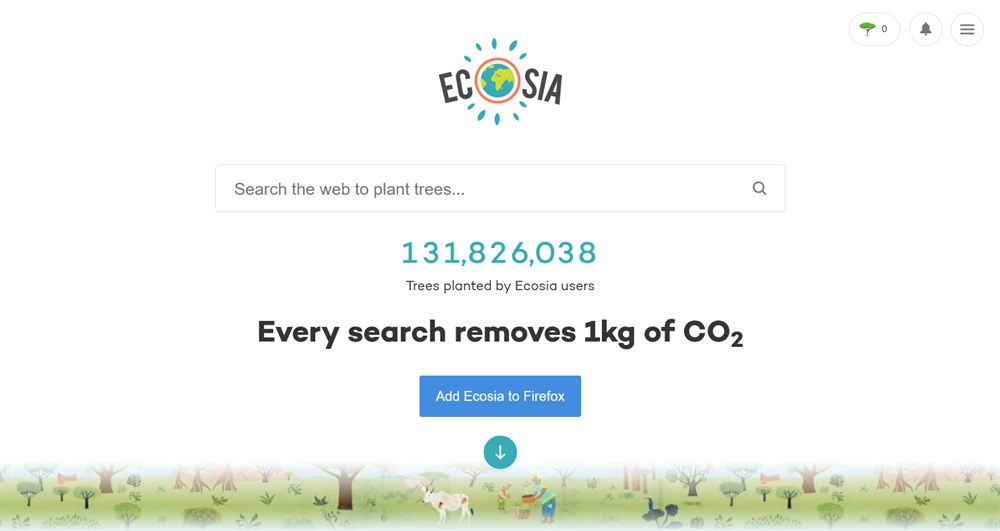
Ecosia markets itself as an ethical search engine. It promises to be carbon neutral and to plant trees to offset carbon generation in society.
We’re not sure whether we believe the efficacy of its claims or not but the functionality of the search engine certainly delivers on its promise.
Searches are fast and deliver relevant results delivered by Bing, there are clear privacy policies and the engine says it anonymizes data ‘within one week’.
Features of Ecosia:
- Carbon neutral search engine
- Plants trees to offset generated carbon
- Has clear privacy policies and doesn’t track much
- Uses Bing for searches so has good coverage
Pros of Ecosia:
- Ideal for the more environmentally-aware searcher
- Likes to plant trees to offset carbon
- An ethical alternative to the mainstream
- Searches are relevant
Cons of Ecosia:
- The implication that some data is recorded and is identifiable for a week
- Not sure if this is a gimmick or will make a genuine difference
Opinion of Ecosia
We all have to be much more aware of the impact we’re having on our climate but we’re not sure Ecosia delivers anything genuinely useful. That aside, the search engine itself uses Bing, so works well and delivers relevant results. Just without the data harvesting.
12. Search Encrypt
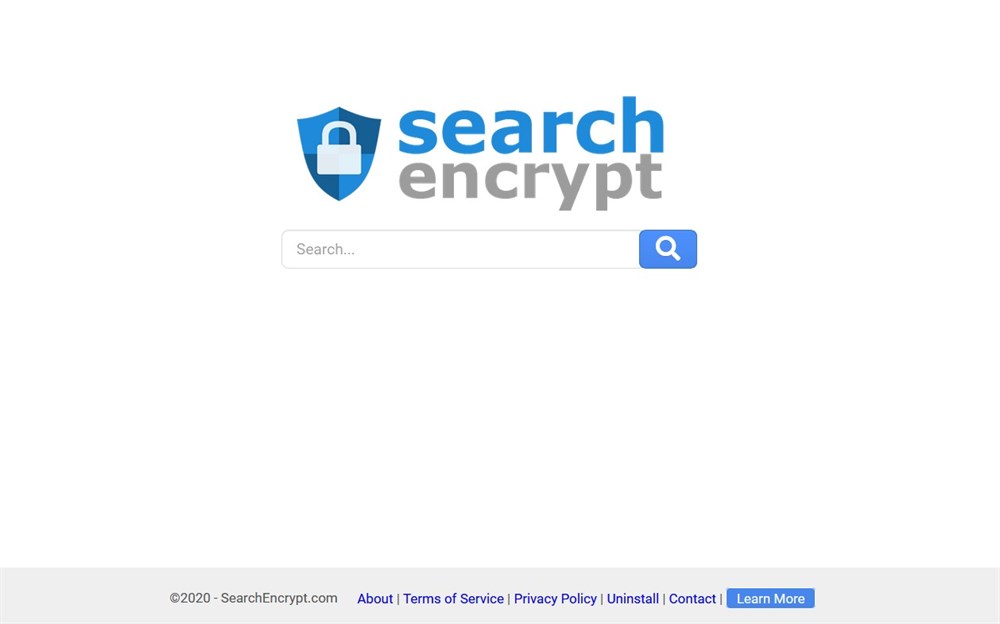
Search Encrypt is another private browser that doesn’t track. It uses strong local SSL encryption to protect data during searches and prevents redirection and interception often used in ad tracking.
Search Encrypt also drops your search history after 30 minutes, so you leave no trace.
The search engine is fast, works well and delivers a wide range of searches quickly. There is a tiny delay in some searches but that’s a small price to pay for anonymity.
Features of Search Encrypt:
- Does not track or retain search data
- Uses extra SSL encryption on top of the standard to protect users
- Searches are fast and relevant
- The interface is super-simple and intuitive to use
Pros of Search Encrypt:
- Truly private browsing
- No data retention after 30 minutes
- Uses extra encryption for extra security
- Searches are fast and relevant
Cons of Search Encrypt:
- Ad supported
- Small delay in results but it is barely noticeable
Opinion of Search Encrypt
Search Encrypt is a genuine option for the privacy conscious. It doesn’t track, drops all activity after 30 minutes and encrypts all searches. All while delivering great performance and relevant results.
13. Lukol
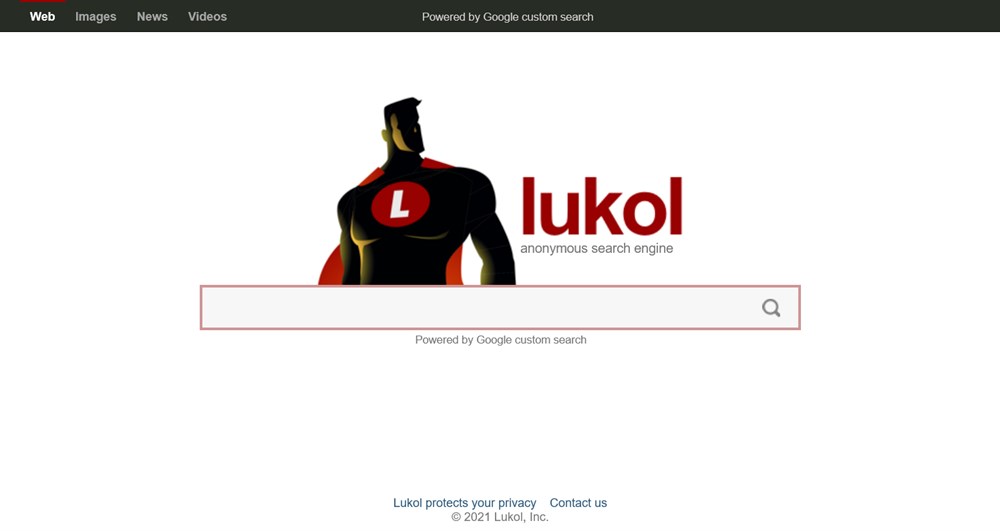
Lukol is a useful search engine. It uses Google to deliver results but uses proxies and other techniques to remove all tracking. That means you get all the goodness of Google search in an alternative search engine.
The interface is simple, with a single search box. It makes it clear that it uses Google but also that it protects your privacy.
As well as standard searches, it can perform image and video search too. All using Google.
Features of Lukol:
- Uses the power of Google while removing the tracking
- Uses fast proxies to keep you anonymous
- Includes image and video search
- Delivers fast, relevant results
Pros of Lukol:
- The power of Google without the tracking
- Proxies seem fast most times of day
- Clear privacy policies
- Image and video search
Cons of Lukol:
- None that we came across
Opinion of Lukol
Lukol lets you perform basic searches quickly and easily using Google. It also enables image and video search too. If you’re used to filtering searches, you won’t find that option here but otherwise, this is one of the best search engines for privacy.
14. Disconnect Search
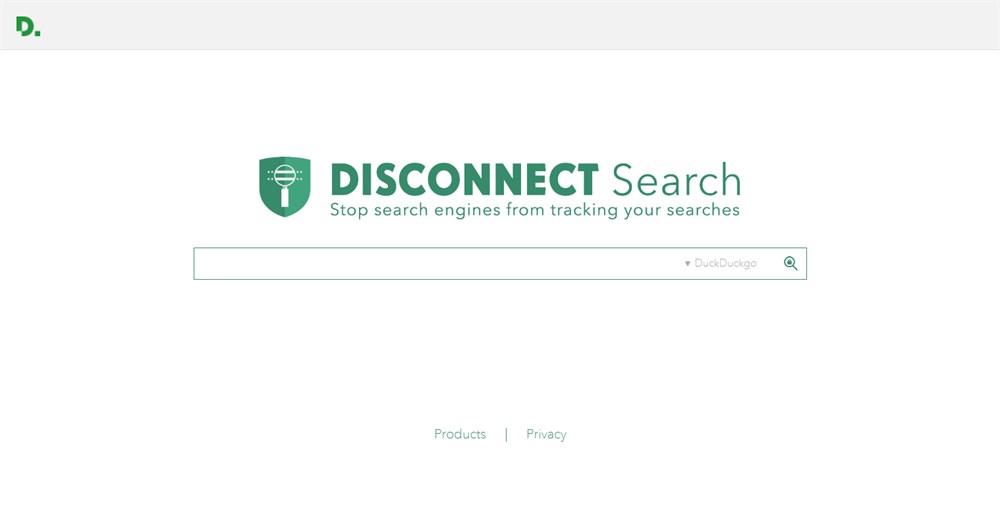
Disconnect Search is a private internet search engine that utilizes other search engines but anonymizes the search. It uses DuckDuckGo, Bing or Yahoo and its own proxies remove any identifiable data before passing the query onto the engine.
The interface is clean and immediately recognizable, searches are fast despite the extra steps and as it uses well-known search engines, those results are relevant too.
Features of Disconnect Search:
- Clean, simple web searches
- Anonymizes your data and doesn’t track
- Uses well-known search engines
- Also offers other security products
Pros of Disconnect Search:
- Searches are fast and relevant
- You can select your own search engine
- Extra security products might be useful
- Simple to use
Cons of Disconnect Search:
- None that we noticed
Opinion of Disconnect Search
Disconnect Search offers privacy-oriented search while utilizing the power of other search engines. It’s effective and delivers relevant searches, so there is very little to complain about here.
15. Qwant
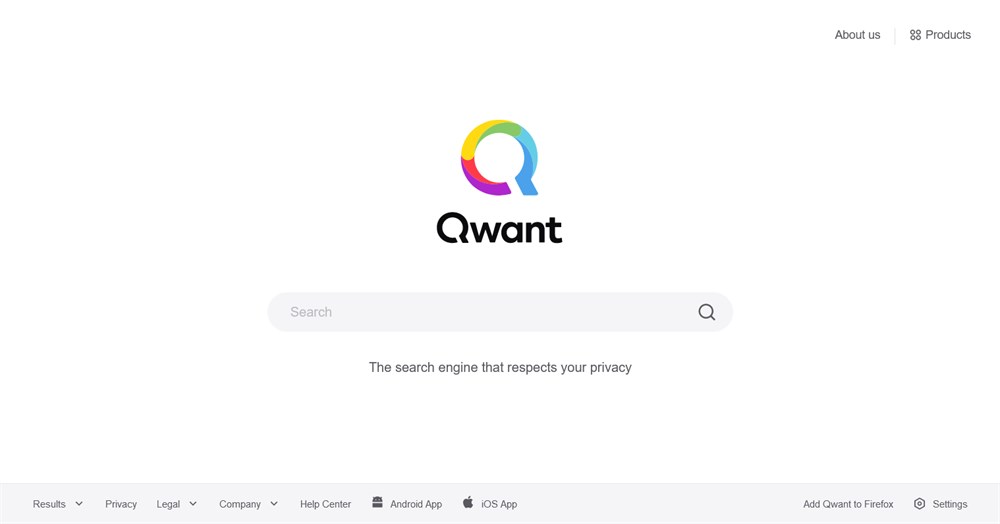
Qwant is a French alternative search engine that has privacy as its focus. It’s a simple design with main search section and a modest news and trends section underneath.
Qwant is a privately owned search engine and offers standard search, image and video search maps and a neat Junior mode that offers ‘responsible search adapted to 6-12 year olds’. That’s a very useful function if you’re trying to protect young ones.
Features of Qwant:
- Searches are fast and relevant
- No tracking and respectful of privacy
- Junior Mode is a nice touch
- Image and video search
Pros of Qwant:
- Searches are fast and relevant
- The interface is clean and instantly understandable
- Comes with a Chrome extension
- Junior Mode
Cons of Qwant:
- No real downsides
Opinion of Qwant
Qwant is a genuine alternative search engine, just like most of these in our list. It combines privacy with search and manages to deliver fast, relevant results. What’s not to like?
16. MetaGer
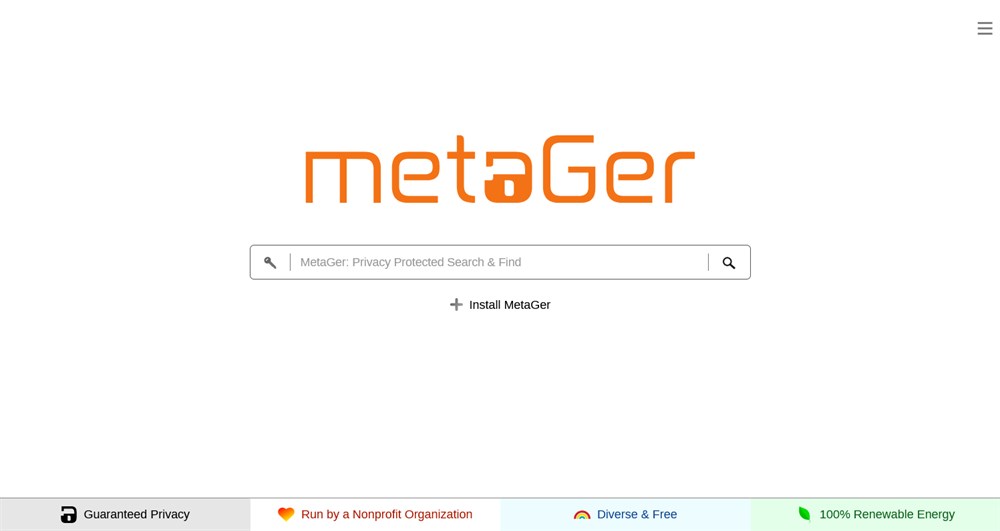
MetaGer is a metasearch engine, meaning it uses multiple search engines to deliver its results. While some of the other alternative search engines in this list do the same thing, MetaGer uses up to 50 of them.
MetaGer anonymizes searches before sending them to search engines and strips any tracking off before presenting the results. It doesn’t track and has an ‘Open Anonymously’ option within results.
It also shows you what search engine returned the result.
Features of MetaGer:
- Metasearch engine that uses up to 50 engines for results
- Anonymizes searches and removes tracking
- Works fast and efficiently
- Open Anonymously is a cool feature
Pros of MetaGer:
- Fast, reliable results
- Simple interface with clear controls
- Shows you what search engine provided the result
- No tracking or tracing
Cons of MetaGer:
- Open Anonymously sometimes returns ‘Access Denied’ results
Opinion of MetaGer
MetaGer is a fast, effective alternative search engine. While it won’t win any design awards, it’s clean, crisp and easy to use.
17. Dogpile
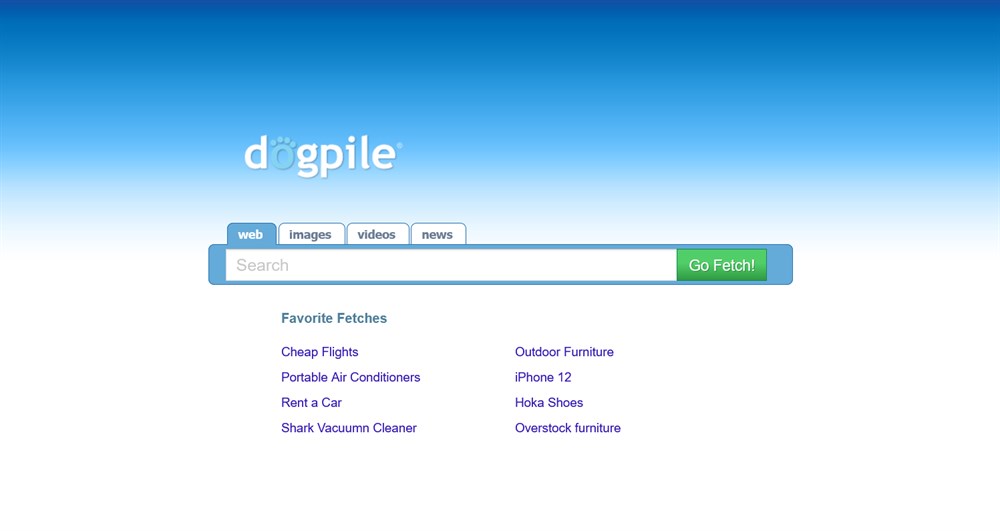
Dogpile is a middle ground between mainstream search engines and private ones. It does collect data to ‘personalize’ your results but nowhere near as much as Google does.
Dogpile collates returns from the main search engines and places them into a single results page. It can also search images and videos too.
It is ad supported and you will see personalized ads, but less so than Google.
Features of Dogpile:
- Uses results from the top 3 search engines
- Works quickly and provides relevant results
- Attractive interface with nice branding
- Offers image and video search
Pros of Dogpile:
- Works quickly
- While it does track, it is open about it
- Collates results from multiple search engines
- Handles video and image search too
Cons of Dogpile:
- Still tracks and isn’t as privacy focused as some
Opinion of Dogpile
Dogpile is a useful internet search engine that collects results in an attractive page design. It does track and trace but it doesn’t hide the fact, so is worth checking out.
18. Infinity Search
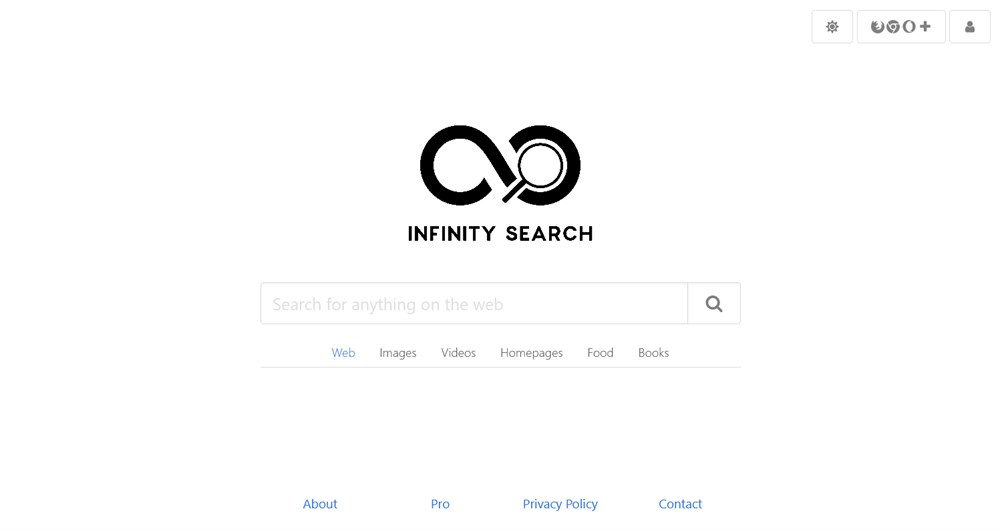
Infinity Search is an open source project with privacy at its core. It uses a clean minimalist interface with a central search bar and is very easy to use.
The downside is that it isn’t free to use. You’ll need to subscribe $5 per month to have access to the search.
In return for that, you get zero tracking, a search engine that doesn’t retain searches and a smart sidebar that shows the source of results and alternatives.
Features of Infinity Search:
- Open source search engine
- Does not track, trace or record searches
- The sidebar offers alternative results for extra goodness
- Clean, crisp interface makes searching easy
Pros of Infinity Search:
- Open source so no shareholders or ad revenue
- No tracking or tracing
- Results are fast and relevant
- The sidebar with extra options is useful
Cons of Infinity Search:
- You have to subscribe to use it
Opinion of Infinity Search
As a concept, Infinity Search works on every level. It’s open source, privacy oriented and doesn’t track or record anything. Yet, there are other search engines that offer the same thing but don’t charge for the privilege.
Which Is the Best Search Engine?
Unfortunately, Google is the best search engine. It has had the most investment, the most development and some of the best brains in the world behind it. But, there’s a cost.
Google harvests an incredible amount of data and is very coy about exactly how much.
The best alternative search engines can be found in this list. To be fair to all those mentioned, you won’t be sorry if you use any of the search engines here.
If you’re looking for something specific:
We recommend DuckDuckGo or StartPage for privacy, speed and relevance.
We recommend WolframAlpha for academic use, research or for comparing websites against each other.
We recommend Swisscows for the reassurance of knowing absolutely nothing you’re doing online is being tracked.
Every search engine here is worth checking out and trying at least once though. They all do search well while collecting less than Google!
What alternative search engines do you use? Do you use any in this list? Have any others to suggest? Tell us your thoughts below!

Abhijeet Kaldate is the co-founder and CRO of Brainstorm Force. With a keen eye for detail and a knack for getting things done, Abhijeet oversees the company's operations, managing key areas such as HR, marketing, design and finance.
Disclosure: This blog may contain affiliate links. If you make a purchase through one of these links, we may receive a small commission. Read disclosure. Rest assured that we only recommend products that we have personally used and believe will add value to our readers. Thanks for your support!


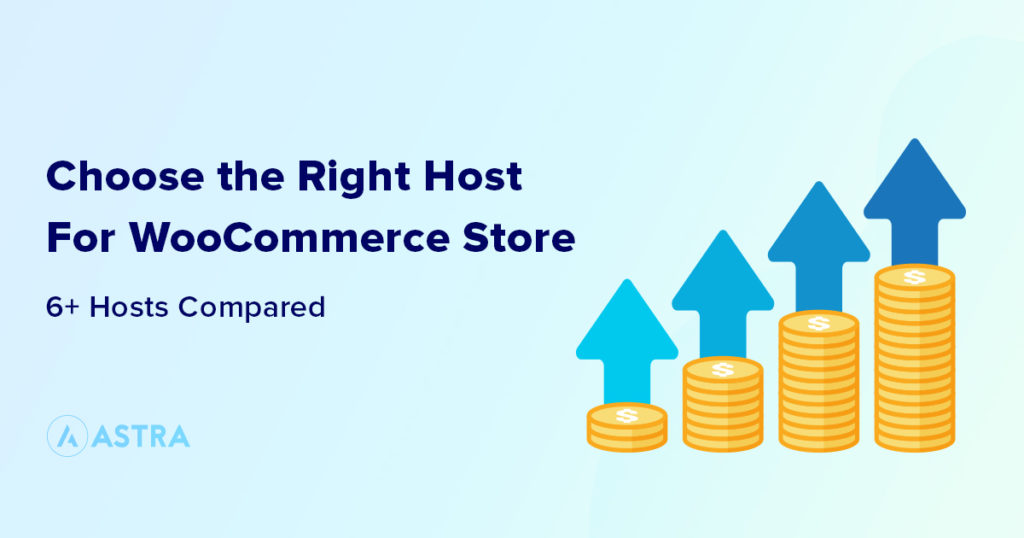





I’ve recently begun using Brave Search Engine Beta from the developers or Brave Browser, its marketed as being private but presently it’s still a ways off being a major contender right now in its beta stage but I still have it as my Brave browsers default browser so I do try using it initially and if I still am unable to find what I’m looking for it does have the feature to use Google or Bing etc as a fallback option either natively in the same search session or manually via a button to redirect your current search term but on Google or Bing etc via aforementioned button.
Just thought I’d mention it.
Hello John, thanks for sharing your insights!